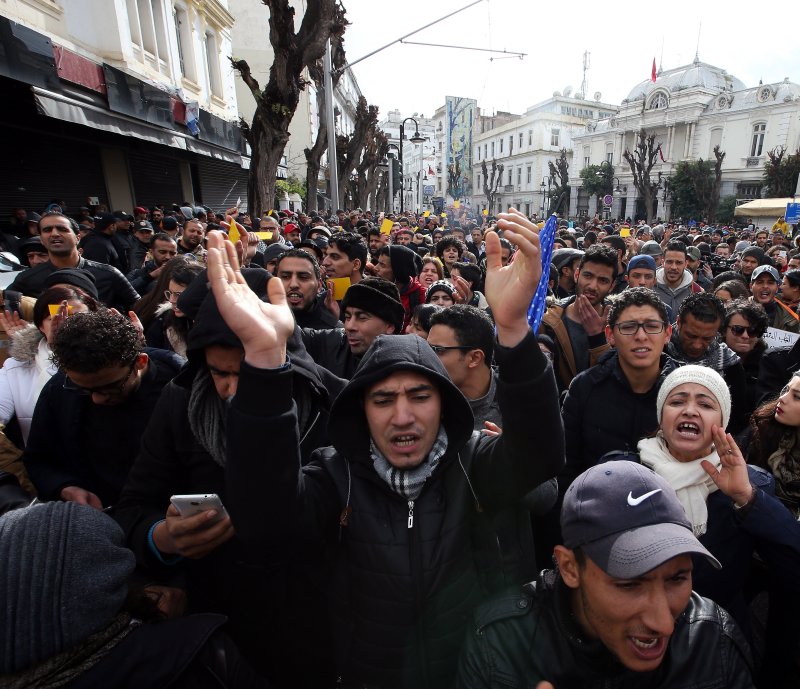TUNIS, Tunisia, Jan. 16 (UPI) -- From Tunisia to Sudan and Iran, governments in the Middle East and North Africa region are facing waves of unrest triggered by economic, social and political factors.
Even oil-rich countries, such as Algeria and Saudi Arabia, have had to reckon with an inability to deliver customary entitlements, be they subsidized goods or free utilities.
The region's unrest is occurring against a background of economic slowdown. A World Bank report noted that growth in the Middle East and North Africa region is estimated to have declined to 1.8 percent in 2017 from 5 percent the previous year.
The report mentioned "hydrocarbon sector-led growth decelerations among regional oil exporters" as factors contributing to the slump.
Slow economic growth is making it impossible for governments, such as Tunisia's, to create enough jobs or to limit the appeal of the informal economy and its social ramifications.
The revenue shortfall is complicated by the security situation in many parts of the region but also by demographics. The countries of North Africa and the Middle East must contend with a disproportionately high number of young adults clamoring for jobs. The United Nations estimates that youth populations, already more than 30 percent, are expected to grow another 20 percent in the next decade in the region.
In Tunisia, seven years -- almost to the day -- since the uprising that toppled the regime of President Zine el-Abidine Ben Ali in 2011 and ignited unrest across the Arab world, protests erupted over price hikes and tax increases that had been voted by parliament as part of the 2018 budget bill.
Despite the success of the country's democratic transition, successive Tunisian governments have had a hard time ensuring economic recovery or meeting the socio-economic demands of a restless population. A poll by the U.S. International Republican Institute indicated that no less than 83 percent of Tunisian respondents said the country was heading in the wrong direction, with most of the public stating a concern about the economy.
Coping with its own budget deficit, oil-rich Algeria announced a temporary ban on 900 imported products, including cellphones, as well as a 30 percent hike in taxes and customs duties on some imports.
In Khartoum and southern cities of Sudan, authorities cracked down on demonstrators expressing discontent over increases in bread prices after the government cut subsidies in an austerity measure aimed at facing a hard currency deficit and high inflation rate.
Even in oil-rich countries, populations have felt the effects of the fall in the price of hydrocarbons since mid-2014. Saudi Arabia hiked petrol and fuel prices and imposed a 5 percent value-added tax on most goods and services, ending a decades-long, tax-free policy.
Saudi Arabia was among many Arab countries where an increase in gasoline and fuel prices was announced at the start of the year. In Riyadh, Manama and Abu Dhabi, value-added taxes were imposed for the first time. However, new handouts, estimated at more than $11 billion, were announced by Riyadh to offset the effects of the austerity measures.
Some reactions showed that old entitlements die hard. Saudi authorities announced that 11 princes staged a sit-in at Qasr Al-Hokm palace, objecting to a royal order that halted payments by the state to members of the royal family to cover their electricity and water utility bills. The princes were arrested.
Unrest in the Arab world comes against the background of protests in neighboring Iran where price hikes triggered nationwide demonstrations jolting the ruling mullahs into admitting that more than economic woes were at stake. "It would be a misrepresentation [of events] and an insult to Iranian people to say they only had economic demands," Iranian President Hassan Rohani was quoted as saying.
Iran may be compelled to rethink its spending priorities. It is far from certain, however, whether the perks of Iran's Islamic Revolutionary Guard Corps or the billions Tehran spends on regional wars could be in jeopardy.
With elections this year in Lebanon, Tunisia, Egypt and Iraq, social unrest is likely to exert additional pressures on leaders in the region who are struggling with voter apathy and pervasive skepticism about political processes.






